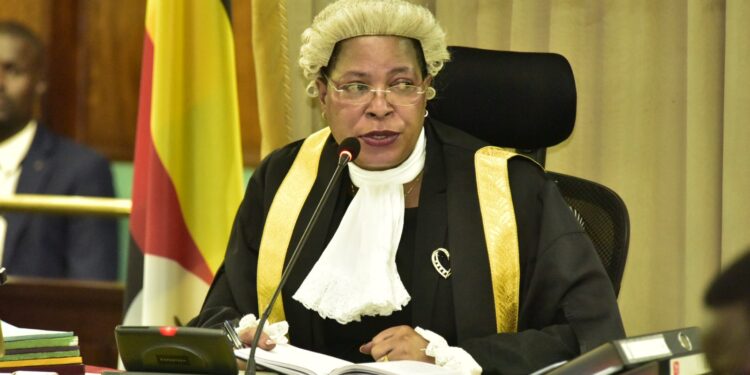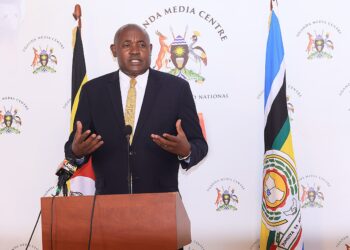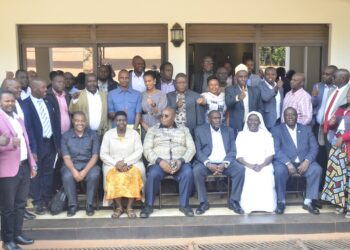In the corridors of power, the role of the Speaker of Parliament is pivotal, wielding authority over legislative proceedings and ensuring the orderly conduct of parliamentary affairs.
However, recent observations have sparked debate regarding Speaker Anita Among’s approach, prompting questions about whether she is simply maintaining decorum or edging towards wielding unchecked power akin to a dictator within the chambers. This scrutiny illuminates the delicate balance between maintaining order and upholding democratic principles at the heart of legislative governance.
During a Thursday plenary which was called on the spot without informing most of the lawmakers especially those in opposition, the Speaker issued an order to all Political Parties in Uganda to seek her approval before assigning an independent Member of Parliament to any responsibilities, saying as the Dean of the Independents in Parliament, she needs to be consulted before her MPs are coopted to any political party duties.
“And next time I want to ask the parties when you assign my independent responsibility, you must get permission from the Dean of Independents who is the Speaker.”
She did not, however, cite any legal provision requiring political parties to obtain her consent prior to designating Independent MPs for positions. Many independent Members of Parliament currently serve as chairmen of Committees and Shadow Cabinets, which are typically headed by the Leader of the Opposition. This case highlights a notable break from tradition and raises questions about the workings of party autonomy and legislative appointments.
The speaker’s orders were prompted by the Ndorwa East lawmaker Wilfred Niwagaba a Shadow Attorney General. Who was assigned by the Leader of the Opposition, Joel Ssenyonyi to express the opposition’s displeasure in the manner in which the Speaker summoned the House without adequate notice for today’s plenary sitting, because in an earlier communication with Joel Ssenyonyi the House was supposed to sit next week on Tuesday 21st May 2024, and that would explain why the majority of Opposition MPs were absent in today’s plenary sitting.
The Speaker however did not reveal why the House was summoned on Thursday but rather refuted Niwagaba informing him that he was not supposed to represent the Leader of the Opposition because is an independent MP and the Speaker is her leader.
“Have you been assigned as a member of Opposition or my member of independent? Because I am your Dean I wasn’t asked as to whether I should give out my person. You are my person, my very own and I wasn’t asked whether my independence should be given to act as Leader of the Opposition. I adjourned the House sine die, I can even call it one hour after. It wasn’t specific that the House should be called on the particular date,” said
The controversy comes in that Niwagaba is the Shadow Attorney General, appointed by the Leader of the Opposition, and is an independent lawmaker whose dean is the Speaker. This situation raises questions about the Speaker’s encroachment on the Opposition Leader’s prerogatives, particularly in delegating responsibilities to independent members of the shadow cabinet. It underscores a need for clarity on the legal framework governing legislative procedures and the delineation of powers within the parliamentary structure.
This is also a call from the two parties to find the centre point to balance the power before it slides to one side making the whole bob swing one-sided.
The Speaker was also once time seen backing Deputy Attorney General, Jackson Kafuuzwhom he accused of failing to defend the stand of the parliament before the president regarding the Anti-gay law. This annoyed the Speaker and even banned him from defending any bill before the president as long as she was still the Speaker of the House.
Hon Kafuuzi, there is only one Speaker in this House. I want to make an order that you will not come to this House again to defend any Bill. You will not do it as long as I am still the Speaker,” Among ordered.
This choice created a two-sided conundrum. Though it may not have been the best course of action, Kafuuzi’s punishment-being prohibited from defending any bill raises concerns about how proportionate it was. He might become irrelevant in upcoming House sessions as a result of such a heavy punishment, which might reduce his efficacy as an ex-official in Parliament.
Nonetheless, it has long been customary for speakers in Uganda’s Parliament to exercise influence on their colleagues; previous Speaker Kadaga, for example, showed her strong leadership by chastising disobedient MPs. She is renowned for disciplining rebel MPs in 2014, namely Mohammad Nsereko, Wilfred Niwagaba, Theodore Ssekikubo, and Bernabas Tinkasiimire. Throughout her tenure, the tradition of disciplining dissident members remained, indicating that her successor will likely adopt a similar strategy.
However, as the country’s highest legislature, Parliament is highly respected, and its presiding officials must protect its honour and dignity at all times. They must therefore demonstrate by their conduct that they are committed to maintaining the institution’s honour and integrity.
Do you have a story in your community or an opinion to share with us: Email us at editorial@watchdoguganda.com













